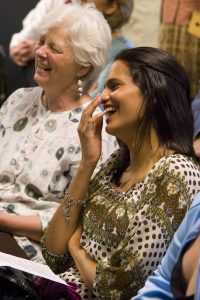WISE is so often a family affair. One sibling does WISE and it becomes The Thing for all the others to do as well. Well, at Rockland Country Day School siblings really don’t have much of a choice because EVERY senior does a WISE project. But siblings DO like to out-do each other if they can.
Looking back on the brother/brother – sister/sister – brother/sister combinations that RCDS has had over the nine years that WISE has been in place, all have been noteworthy and different. Perfect example: the Kapilow brothers.

Ben at left, Adam at right
Ben graduated in 2009; Adam in 2013. Ben is now doing graduate work at Peabody Institute, a music conservatory in Baltimore; Adam is still in college at Swarthmore. Both were great students and ones who wanted to pursue a particular passion in their WISE projects. And did so. In very different fields!
Ben’s Project Ben was pretty sure he wanted to study music when he got to college although he was planning on a liberal arts education (with a good music program). In his WISE proposal, he laid out very clearly what it was that he wanted to do:
Create a Portrait of each senior in music: I want to write one song about each person in the senior class. However, I want to try to get one other person in either my home community or the RCDS community to be involved in each song. So, they might play an instrument, sing, write the lyrics (I would have them write the words first, and then I would set those words to music), or any other creative way that they could help. But my goal would be to have at least one person involved in every song. Eventually, I’m going to put all of the songs on a CD and give a copy to whoever wants one. Also, if someone objects to having a song written about them, then I will just skip over them. (by the way, no one did!)
An Assortment of Songs
Essential Question: How can I use music to delve inside the mind and personality of a student in the senior class?
How: The Songwriting Process. In this project (and in general), I plan to write music in a lot of different genres and styles. Therefore, I will start out by considering which type of music most reflects the nature of the song’s subject. For instance, if I were writing a song about a complex psychological idea, or a theory I have on society, I would probably write something sounding like contemporary classical. However, if I wanted to write a funny song about money, a show tune would probably be the most effective. And there are also certain “styles” within each genre. For instance, contemporary, fast classical music would be suitable for a completely different type of piece than would a slow, Tchaikovsky-like piece.
Achieving the perfect type of atmosphere requires long amounts of time at the piano experimenting with different styles. Once I have gotten in the “zone” and picked out the right style, I sit down at the piano and go on a random, improvised, rant-like free-for-all for hours, and I usually am able to come up with two or three short ideas (musically or lyrically) that I like. Then I think where in the piece I would want to place some of those ideas, and after I have a rough idea of what direction I want the piece to take, I start.
Ben went on to compose 17 songs about the 17 seniors. In his presentation he explained the process of creation, its joys and pitfalls, and demonstrated his method of going about it by creating yet another song, this time about his mentor. The songs themselves were performed, as he had hoped by a variety of students, friends, faculty and parents, in a triumphant concert after the presentation. His planning for this can be seen in the following excerpt from his journal:
Ben K’s production of 17 seniors
-
Matt’s song: Jason sings, I play piano.
-
Adam’s song: Billy Roues and Noah play guitar, Dakota plays bass, Julie plays drums, I sing.
-
Jason’s song: Me, Hailey, Emily D (an outside friend of Jason’s), plus one more student who I haven’t decided on yet, will rap.
-
Flo’s song: Mrs. Nodelman plays cello, and I sing.
-
Santos’s song: Gina and I sing, and Erica plays oboe
-
Hailey’s song: I play piano and sing, and Eli plays cello and sings
-
Amelia’s song: I play piano, and Tim sings
-
Gabby’s song: I play piano, and Alan sings
-
Ian’s song: Haley P and I play a piano duet, and I sing.
-
Luke’s song: I play piano and sing, and my sister and a bunch of her friends sing.
-
Molly’s song: This is a sort of techno song, so all I would need to perform this would be speakers and something to plug my computer into, both of which are in the band room.
-
Julian’s song: I play piano and sing, Amelia sings, Brigid and Adam play clarinet, Matt Hilgenberg and Alan play trumpet, Isabelle plays flute, Sarah plays double bass, Julie plays drums, and Michael Heller plays tenor saxophone.
-
Lee’s song: I play piano and Adam Geber sings.
-
Haley’s song: I play piano and Isabelle sings
-
Andrew’s song: I play piano, trumpet, violin, drums, and guitar, and Mr. Boyer sings
-
Julie’s song: I play drums, Julia Liu plays piano, and Luke sings
Ben’s Audience Breaking Up
If I were to do every single song, it would take about 50 minutes, if you include the changing between songs. Each song is about 2 and half minutes, and I would rather not cut more than 3 or 4 songs, but I would be understanding if things did not go my way. (It went his way – nothing was cut!)
The show brought the house down. The verve, the variety, the humor, the compelling and eclectic nature of both music and performers made it memorable. No surprise that Ben is at Peabody today furthering his musical education and career. We like to think that WISE had a hand in that.
Adam’s Turn When it was his brother’s turn, four years later, Adam chose an equally idiosyncratic but quite different project. Adam had been juggling for years and he decided to use WISE time to further his already considerable juggling skills and see where a prolonged focus on juggling would take him.
Adam’s proposal:
The Big Show: a 20-45 minute solo juggling show. I want the show to entertain my audience while also educating them about juggling. Ideally, it will become a beautiful mix of comedy, multimedia, education, audience participation and joy.
Juggling is my passion in life…I’ve performed hundreds of times over the last 3-ish years, and I’ve grown to relish the experience; however, I understand that there’s still quite a large gap between where I am now and where I would have to be as a professional performing juggler. Over the course of this WISE project, I intend to begin to bridge this gap and learn if I want to close the gap completely and potentially become a professional performing juggler, at least part-time.
Essential Question: What does it take to be entertaining? What does it take to be an entertainer? Why is live entertainment important? Do I really want to be a performing juggler or not?
How: The easy part will be practice. Daily practice, even if it’s only for 15 minutes or so, with at most 1 or 2 days off per week. I’m used to this by now, and I’m pretty confident I’ll be able to do it. Script writing, re-writing, re-writing and more re-writing. A hefty quantity of philosophical discussions on the nature of live performance Performances in less formal settings, walk-around events, hopefully some busking as well, because techniques used to draw in an audience that hasn’t paid to see you should just as easily draw in an audience that has paid to see you. Plus, all performance is based in improv, and street performance is the most unpredictable venue there is.
Performances with AGC, both paid and volunteer, as ways to test out and
improve the material that I create over the course of this year.
Skills needed: I’m interpreting this as skills that I already have that are relevant. Technical juggling ability, stage fright control, stage confidence, open mind, determination
Skills to be gained: Realistic assessment of my own abilities as a performer,
learning to play to my strengths and diminish my weaknesses. The ability to talk and make jokes onstage as myself, both scripted and improvised. The ability to command a stage for a sustained period of time by myself. An understanding of the comedic writing process. Pessimism and pragmatism, along with optimism and impracticality when necessary. I want to get better at deciding what I want and acting on it, as opposed to not knowing what I want and pushing off decisions until the very last moment.
Adam, too, completed his project with a presentation explaining the process and a performance that capped off all the performances he had given in the past, including those done during his WISE project period. He continues to juggle magnificently and posts videos on You-Tube which you can watch to see his amazing and ever increasing command of the art.



 Saving...
Saving...